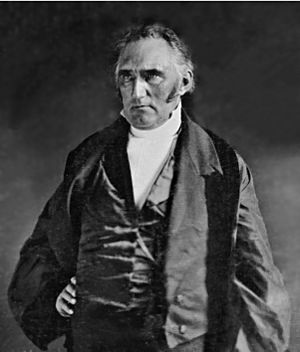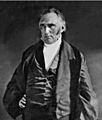Francis Wayland facts for kids
Quick facts for kids
Francis Wayland
|
|
|---|---|

Half plate daguerreotype
|
|
| 4th President of Brown University | |
| In office 1827–1855 |
|
| Preceded by | Asa Messer |
| Succeeded by | Barnas Sears |
| Personal details | |
| Born | March 11, 1796 New York City, New York, U.S. |
| Died | September 30, 1865 (aged 69) Providence, Rhode Island, U.S. |
| Resting place | North Burial Ground Providence, Rhode Island, U.S. |
| Nationality | American |
| Alma mater | Union College |
| Signature | |
Francis Wayland (March 11, 1796 – September 30, 1865) was an important American Baptist minister, educator, and economist. He served as president of Brown University. He was also a pastor at the First Baptist Church in America in Providence, Rhode Island.
A school called Wayland Seminary was started in Washington, D.C., in 1867. It was named after him and mainly helped educate former slaves. This school later joined with another to become Virginia Union University.
Contents
Early Life and Education
Francis Wayland was born in New York City in 1796. His father, also named Francis, was a Baptist pastor from England. Young Francis graduated from Union College in 1813. He then studied medicine in Troy, New York.
In 1816, he decided to study theology at Andover Theological Seminary. He couldn't finish his studies there because he didn't have enough money. From 1817 to 1821, he worked as a tutor at Union College. After that, he spent five years as a pastor at the First Baptist Church of Boston. In 1826, he returned to Union College as a professor.
Wayland was also one of the people who helped start the Newton Theological Institution in 1825.
Advocacy and Social Causes
Francis Wayland believed strongly in several important causes. He supported the temperance movement, which aimed to reduce alcohol use. He was also an early supporter of anti-slavery, working to end slavery.
For many years, he helped oversee the state prison and local jail. He was also president of the Prison Discipline Society. He worked hard to improve prisons and supported local charities. During the "Dorr Rebellion" in 1842, he was a leader who supported law and order. People even called him "the first citizen of Rhode Island."
Wayland helped and encouraged Leonard Black, a former slave who became a Baptist minister. Black wrote a book about his life. Wayland tried to keep the Baptist churches from splitting over the issue of slavery, but he was not successful.
He became a member of the American Philosophical Society in 1838. In 1851, he joined the American Antiquarian Society.
Leading Brown University
In 1827, Francis Wayland became the president of Brown University. He led the university for 28 years. During his time, he made many improvements. He helped improve academic rules and built up the library. He also made science studies a more important part of the curriculum.
Wayland also worked to improve education outside the university. He wrote textbooks on ethics (moral principles) and economics (how money and resources are managed). He also helped promote the free public school system in Rhode Island, especially in Providence.
His ideas for educational reforms were shared in his writings. These included Thoughts on the Present Collegiate System in the United States (1842) and his Report to the Corporation of Brown University of 1850. He suggested adding courses that focused on practical skills, like industrial studies. Some of these ideas were put into practice during his lifetime.
Wayland tried to reform Brown's medical school. However, the faculty and staff disagreed with his changes. They resigned, and the medical program was eventually closed.
Students and colleagues remembered Wayland vividly. Charles T. Congdon and James B. Angell shared their memories of him. They described him as a strict but respected leader. Students were often a little scared of him, but they also looked up to him.
James B. Angell, who later became president of the University of Michigan, said that Wayland helped students develop higher ideals of duty. He also said that Wayland's wise sayings were unforgettable and helpful throughout his life.
Wayland left his position as president of Brown in 1855. From 1857 to 1858, he served again as pastor of the First Baptist Church in America in Providence.
Role in Public Libraries
Francis Wayland was a strong supporter of libraries for a long time. In 1851, he made a donation to the town of Wayland, Massachusetts. This donation helped start a public library there. His action encouraged Massachusetts to pass laws allowing towns to create their own libraries.
Published Works
Francis Wayland wrote many books and articles. Some of his notable works include:
- The Elements of Moral Science (1835) - This book was revised many times and translated into other languages.
- The Elements of Political Economy (1837) - In this book, he supported the idea of free trade.
- Domestic Slavery Considered as a Scriptural Institution (1845) - This was a discussion with Rev. Richard Fuller about slavery.
- Memoir of Harriet Ware (1850) - Harriet Ware founded the Children's Friend Society.
- Memoir of Adoniram Judson (1853) - Adoniram Judson was a missionary to Burma.
- Elements of Intellectual Philosophy (1854)
- Notes on the Principles and Practices of Baptist Churches (1857)
- Letters on the Ministry of the Gospel (1863)
- A short Memoir of Thomas Chalmers (1864).
Legacy and Influence
Several places and institutions were named in honor of Francis Wayland. The town of Wayland, Massachusetts is one example. Wayland Seminary in Washington D.C., which later became part of Virginia Union University, was also named for him.
Wayland Academy in Beaver Dam, Wisconsin, received its name in his honor in 1855. In Japan, the Wayland Day lectures at Keio University are named after him. His writings had a lasting impact on the founder of this oldest university in Japan.
Prominent Son
Francis Wayland had a son also named Francis Wayland III (1826-1904). His son served as lieutenant-governor of Connecticut from 1869 to 1870. He later became a professor and Dean of the Yale Law School.
Images for kids
 | James Van Der Zee |
 | Alma Thomas |
 | Ellis Wilson |
 | Margaret Taylor-Burroughs |


